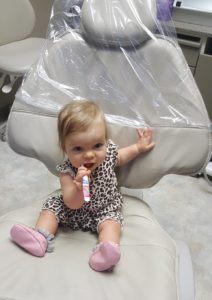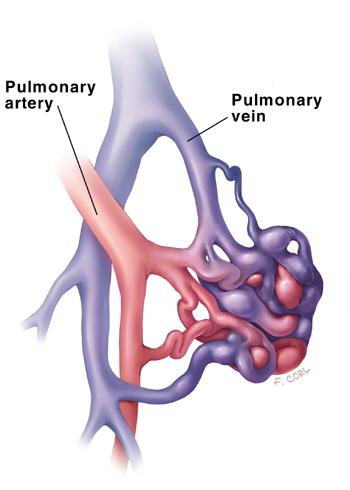Eleanor goes to the dentist with her prophylactic antibiotics!

As a child, I LOVED going to the dentist. I hope by starting Eleanor out young, I can instill an excitement about dental health in her to avoid any fears/anxieties about the dentist in the future.
Going to the dentist with HHT can add a bit of complexity. If you have or don’t know if you have pulmonary AVMs, you should always take an antibiotic before dental procedures. In this post, I’d like to talk about why this is very important, and how it can literally save your life!
The Pulmonary Arteriovenous Malformation (PAVM)
As a reminder, a PAVM is an abnormal connection between an artery and a vein. In normal instances, arteries connect to capillary beds and then connect to veins. The arteries carry oxygen-rich blood to organs and tissues through the capillaries. The low-oxygen blood then returns to the heart and lungs via veins. In the PAVM, the artery is connected to the vein, bypassing the capillaries.
Bacteria
In addition to transferring oxygen into the tissues, capillaries also help filter out bacteria and small blood clots. If a PAVM is present, the blood flows fast through this malformed vessel and it does not go into the capillaries for oxygen exchange. This also means bacteria cannot get into the tissues to go through the body’s system to be filtered out.
If bacteria are present in the blood, the fast and turbulent flow through the PAVM may shuttle the bacteria to another place in the body where it can seed (or plant itself). One place at risk of bacterial infection is the brain. If bacteria settle into the brain, an abscess may form. This could be life threatening and may need to be surgically drained.

PAVM Illustration
Why the Dentist?
During a good cleaning, filling or any other dental procedure, it’s likely your gums will bleed from manipulation of the gum tissue. The mouth has a lot of bacteria in it and some of these bacteria can enter the bloodstream during your dental procedure. Other procedures and surgeries also carry the risk of bacterial infection.
So, why are doctors concerned about taking antibiotics before dental procedures specifically? To answer this question, I asked my college friend and dentist, Dr. Russ Villier who works at Monroe Health Center in Virginia. He explained to me that all surgeries and procedures pose a risk for bacterial infection. However, surgeries are done in a sterile environment, minimizing the risk of infection. While dentists do their best to practice aseptic techniques (aseptic = really clean, but not sterile), the nature of their work poses more of a risk for bacteria to enter the bloodstream. Please note, without AVMs, these bacteria are filtered out and you should never know the difference!
The Role of Antibiotics
It’s recommended to have a single (strong) dose of antibiotic about 30-60 minutes before your dental procedure. Antibiotics are designed to get rid of bacterial cells, but have no effect on human cells. Dr. Villier explained using a strong dose is so the antibiotic will be at clinically significant levels during the procedure and can destroy any bacteria that may enter the bloodstream before they seed somewhere.
It’s true that antibiotics can also destroy healthy/friendly bacteria. It is extremely important to practice good dental hygiene so the number of dental procedures done are minimized to decrease exposure to antibiotics (and it is important anyway for good health!). However, getting a single dose of antibiotics a couple times a year for dental cleanings/procedures should not have much of an impact on overall health.

It might look pretty, but don’t be fooled by this bacteria on your tongue.
Eleanor’s Visit
Even though Eleanor is only 10 months old, she has two teeth (and two more peeking through the gums), which makes her the perfect age for a trip to the dentist. Breastmilk and formula both have sugars that can cause tooth decay, so making sure little ones have a clean mouth and good hygiene is important, even at this age.
Eleanor took her prophylactic amoxicillin an hour before going to the dentist. During her appointment, she was acquainted with the staff at Dentistry by Design in Manhattan, KS. She got to sit in the big chair, show them how she likes to brush her teeth, and she let them examine her. Everyone made it super fun for her, and she had a great time. She even got two new toothbrushes! Her next visit will be in six months for an actual cleaning/polishing.

It really’s challenging to decide on the decent dental care service, however after reading through, this
article it made me think a lot and I are going to attempt o use your suggestions in the future.
Hello, how many doses of antibiotic need to be taken by a person with HHT who is going to have their tooth filled? Should they take the antibiotic only before or also after the procedure?